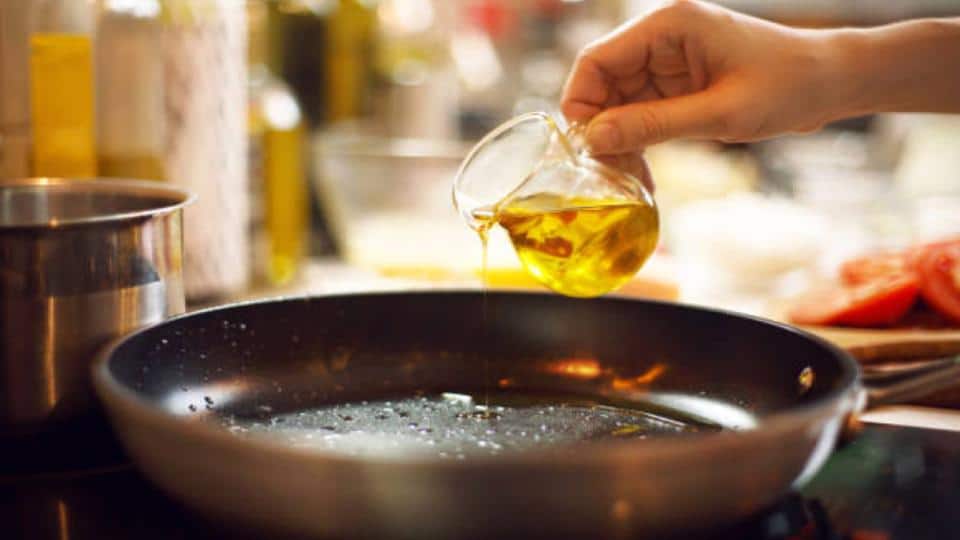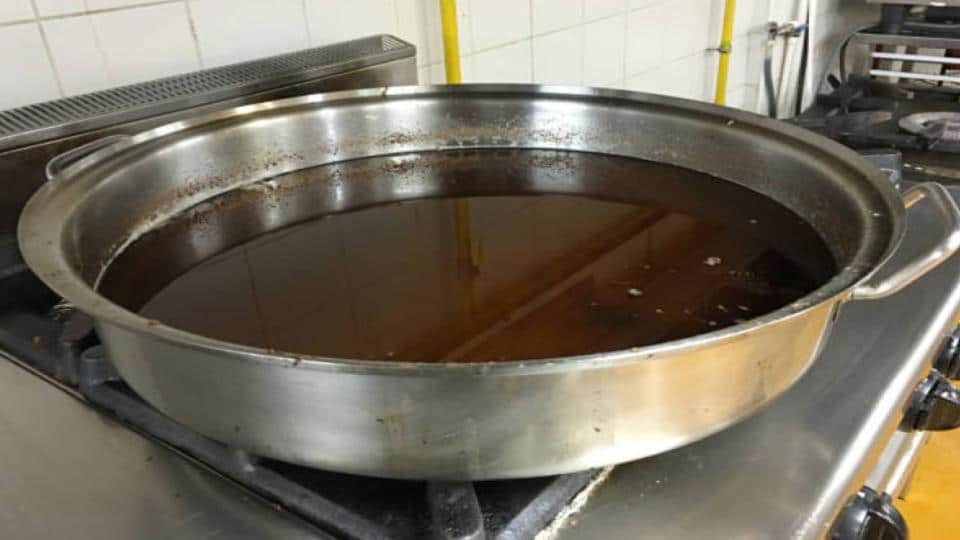How to Store Cooking Oil for the Long Term – Easy Storage Tips

Table
of
Contents
If
you’re
thinking
of
stocking
up
on
cooking
oil,
you
need
to
know
how
to
properly
store
it
for
the
long
term.
The
bad
news
is
it
is
one
of
those
pantry
items
that
are
a
bit
difficult
to
store
for
a
long
time.
Cooking
oil
tends
to
go
rancid
before
the
expiration
date
when
not
stored
the
right
way.
In
fact,
most
polyunsaturated
oils
turn
rancid
before
they
even
start
to
give
off
a
rotten
smell.
When
it
goes
bad,
you
lose
much
of
its
nutritional
benefits.
To
add,
rancid
oil
also
contains
free
radicals
that
are
bad
for
the
health.
So,
if
you
want
to
learn
how
to
store
cooking
oil
long
term,
please
read
on…
Does
Cooking
Oil
Spoil?

Yes,
your
cooking
oil
can
go
bad
if
not
stored
correctly
or
if
it
passes
its
expiration
date.
In
fact,
low-quality
oil
goes
rancid
faster
than
the
premium
options.
Therefore,
it’s
always
a
good
idea
to
go
for
high-quality
products
if
you
plan
on
storing
them
for
a
very
long
time.
Plus,
they
can
be
very
safe
to
use
when
stored
correctly,
with
some
oils
lasting
for
about
5
years.
How
Will
You
Know
If
the
Cooking
Oil
Has
Gone
Bad?

The
leading
cause
of
rotting
in
most
food
products
is
bacteria.
However,
bacteria
cannot
grow
on
oils.
Instead,
oil
becomes
rancid
and
starts
producing
some
toxic
compounds.
There
are
many
signs
of
cooking
oil
going
rancid
or
about
to
go
bad.
The
main
sign
is
the
rotten
or
sour
smell.
If
you
notice
a
hint
of
awful
smell
from
your
oil,
then
it
may
be
going
bad.
When
oil
starts
going
rancid,
its
color
will
change
because
of
the
molds
growing
in
the
container.
You
may
also
notice
a
change
in
thickness.
This
happens
when
it
starts
to
rot.
Rancidity
destroys
some
of
the
vitamins
in
the
cooking
oil,
so
there’s
really
not
much
benefit
in
using
such
oil.
What
Is
the
Shelf
Life
of
Cooking
Oil?

When
stored
in
a
pantry
at
room
temperature,
cooking
oil
can
last
for
up
to
24
months.
But
it’s
very
much
different
once
you
open
the
container
and
start
using
it.
At
this
point,
the
shelf
life
shortens
to
only
6
months.
When
stored
correctly
in
an
airtight
bottle
and
then
placed
in
a
dark,
cool
place,
it
can
last
for
about
5
years.
How
to
Store
Cooking
Oil
Long-Term
The
main
factors
that
affect
the
quality
of
cooking
oil
are
light,
heat,
and
oxygen.
So
if
you
want
your
product
to
last
longer,
remember
to
keep
it
away
from
these
elements.
Another
thing…
make
sure
you
also
consider
the
expiration
date
and
the
container
used
to
store
it.
Don’t
Leave
the
Bottle
Open?
One
of
the
main
things
that
can
spoil
cooking
oils
is
oxidation.
Therefore,
it’s
crucial
that
you
reduce
the
oxygen
content
in
the
oil
bottle.
Unfortunately,
you
can’t
use
oxygen
absorbers
when
storing
oil,
but
you
can
keep
the
container
closed.
The
only
way
you
can
get
rid
of
the
oxygen
already
in
the
container
is
by
using
food
saver
devices.
But,
even
these
devices
can’t
create
a
100%
oxygen-free
environment.
Therefore,
the
best
option
is
to
determine
how
much
oil
your
household
uses
in
a
year.
For
example,
if
your
family
uses
a
gallon
of
oil
per
annum,
you
should
split
it
into
small
containers
that
you
can
consume
within
60
days.
This
means
that
you’ll
only
need
about
6
bottles
every
year,
but
make
sure
you
keep
the
one
you’re
using
closed.
Remember
that
once
the
bottle
is
opened,
the
oil
can
only
last
for
only
6
months,
after
which
it
starts
to
go
bad.
Stay
Away
From
Plastic
Bottles
Most
low-quality
cooking
oils
come
in
plastic
bottles
that
are
not
100%
airtight.
In
fact,
with
time,
tiny
holes
can
start
forming
on
these
bottles
that
can
allow
oxygen
through.
Therefore,
if
you
plan
on
storing
oil
long-term,
you
may
end
up
with
a
messy
pantry,
thanks
to
the
leaking
oil
bottle.
So
it’s
better
to
go
for
metal
tins
or
even
glass
bottles
that
can
keep
the
air
out.
Keep
It
Away
From
Direct
Light
Another
element
that
can
turn
your
cooking
oil
rancid
within
the
shortest
time
possible
is
light.
Exposure
to
light
can
degrade
some
nutritional
elements
of
the
cooking
oils
and
the
production
of
antioxidants.
Keep
the
oil
somewhere
dark
and
away
from
the
light.
You
can
also
go
for
high-quality
brands
that
package
their
products
using
opaque
containers
to
keep
them
fresh
for
an
extended
period.
Keep
It
Cool
Heat
also
plays
a
crucial
role
in
the
lifespan
of
cooking
oil.
In
fact,
certain
long-term
studies
have
confirmed
that
when
olive
oil
is
stored
at
70
degrees
Fahrenheit,
it
can
last
for
over
36
months.
But
when
kept
at
98.6
degrees
Fahrenheit,
it
goes
rancid
within
a
maximum
of
8
months.
Even
when
the
olive
oil
isn’t
exposed
to
light
or
air,
this
can
happen.
Therefore,
it’s
crucial
that
you
monitor
the
temperature
where
you
store
your
cooking
oil
long-term.
You
should
keep
the
temperature
below
60
degrees
Fahrenheit
or
use
it
within
6
months
as
a
rule
of
thumb.
Can
I
Store
the
Cooking
Oil
in
the
Freezer?
One
of
the
best
methods
for
storing
cooking
oil
is
freezing
it.
Some
sensitive
oils
like
truffle
and
almond
oils
that
are
sensitive
to
heat
must
be
refrigerated.
The
low
temperature
will
force
the
oil
molecules
to
slow
down
and
become
cloudy.
But
becoming
cloudy
doesn’t
necessarily
mean
that
the
cooking
oil
has
gone
bad;
it
just
means
that
it
is
frozen.
So
before
using
it,
you
will
have
to
bring
it
to
room
temperature,
and
the
cloudiness
disappears.
Make
sure
that
you
keep
the
temperature
constant
as
repeated
heating
and
cooling
can
make
your
oil
go
rancid
faster.
Store
It
in
Nitrogen-Flushed
Bottles
Some
cooking
oils
like
nut
or
flaxseed
oils
are
prone
to
oxidation.
This
means
that
even
a
tiny
amount
of
oxygen
can
force
the
oil
to
go
rancid
faster.
When
dealing
with
these
oils,
it
is
always
a
good
idea
to
look
for
nitrogen-flushed
bottles.
After
all,
manufacturers
use
nitrogen-flushing
to
remove
oxygen
in
the
bottles
before
sealing
them.
Rotation
Since
cooking
oils
go
rancid
within
24
months,
it’s
always
a
good
idea
to
purchase
only
what
you
can
use.
If
you
don’t
have
a
cool
storage
space,
then
you
may
have
to
use
them
before
the
6
months
elapse.
But
make
sure
you
always
put
the
newer
bottles
at
the
back
of
the
pantry.
FAQs
What
is
the
shelf
life
of
unopened
cooking
oils
stored
in
a
dark
and
cool
place?
Generally,
the
oil
doesn’t
spoil
at
once.
Instead,
it’s
a
gradual
process.
But
after
a
particular
duration,
this
item
may
become
too
sour
to
use.
Some
oils
like
hydrogenated
oils
can
last
for
about
5
years,
while
lard
and
tallow
last
for
less
than
a
year.
Here
are
some
of
the
more
common
cooking
oils
and
how
long
they
last:
-
Peanut
oils:
36
to
48
months -
Olive
oil:
36
months -
Coconut
oils:
24
months -
Sunflower
oil:
24
months -
Corn
oil:
12
months -
Palm
oil:
36
months
Is
eating
rancid
oil
safe?
Rancid
oil
smells
and
tastes
very
bad.
It
lacks
some
crucial
healthy
components.
Fortunately,
it
is
still
safe
to
use
as
it
cannot
cause
food
poisoning.
It
will
not
also
make
you
sick,
like
consuming
rotten
veggies
or
expired
meat.
However,
some
studies
have
confirmed
that
rancid
oil
can
have
some
long-term
adverse
effects
on
your
health.
There
are
animal
studies
confirming
that
rancid
oil
could
slow
down
their
growth
and
affect
their
immune
systems.
Can
you
use
antioxidants
to
store
oil?
Yes,
antioxidants
can
help
prevent
oxidation.
Therefore,
most
producers
use
them
to
increase
their
product’s
shelf
life.
One
of
the
most
common
antioxidants
found
in
most
oils
is
vitamin
E.
Thus,
it’s
a
good
thing
to
look
for
products
with
antioxidants.
Keep
in
mind
that
antioxidants
can
increase
the
shelf
life
of
oils
to
5
years.
Plus,
synthetic
antioxidants
have
a
longer
lifespan
than
natural
ones.
Which
types
of
oil
last
longer?
Generally,
some
oils
can
last
longer
because
of
the
kind
of
fats
they
come
with.
Oils
with
polyunsaturated
fats
can
go
rancid
faster
than
the
ones
with
monounsaturated
fats.
On
the
other
hand,
the
ones
containing
more
polyphenols
can
last
even
longer.
Takeaway
Like
all
other
ingredients
in
our
kitchens,
cooking
oil
can
also
rot
when
not
stored
correctly.
Exposure
to
oxygen
can
result
in
oxidation,
shortening
its
shelf
life.
Other
factors
that
can
induce
rancidity
in
oil
include
heat
and
light.
Therefore,
if
you
want
your
cooking
oil
to
last
longer,
you
need
to
keep
it
away
from
these
elements.
This
means
storing
it
in
a
glass
or
metal
container,
removing
all
the
oxygen,
and
keeping
the
temperature
constant.
The
best
temperature
for
storing
cooking
oils
for
an
extended
period
is
about
60
degrees
Fahrenheit.
